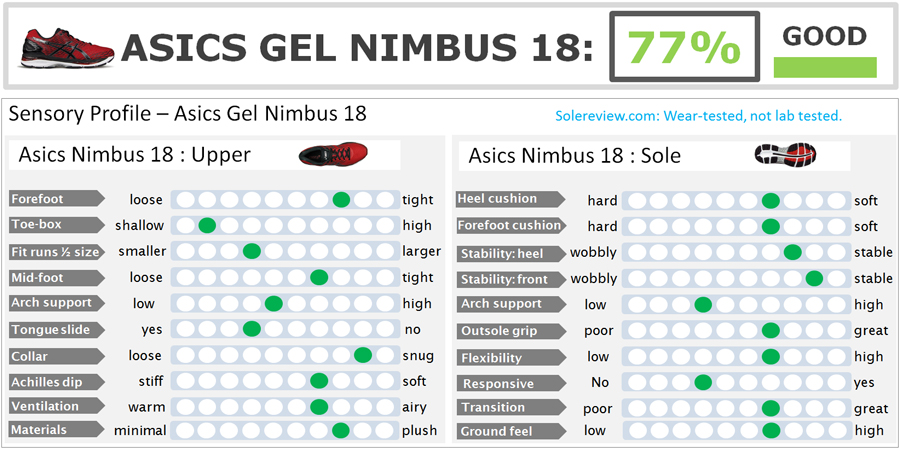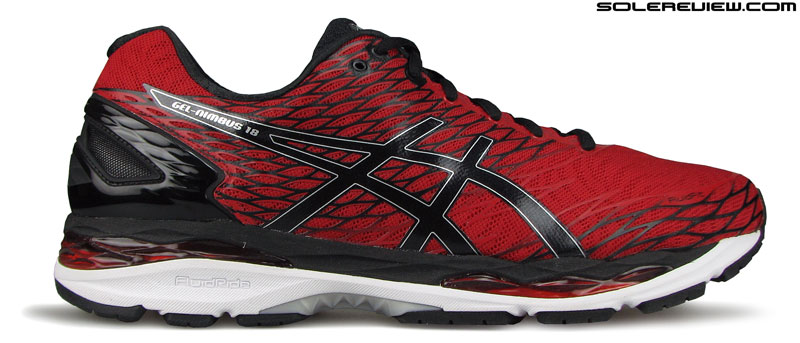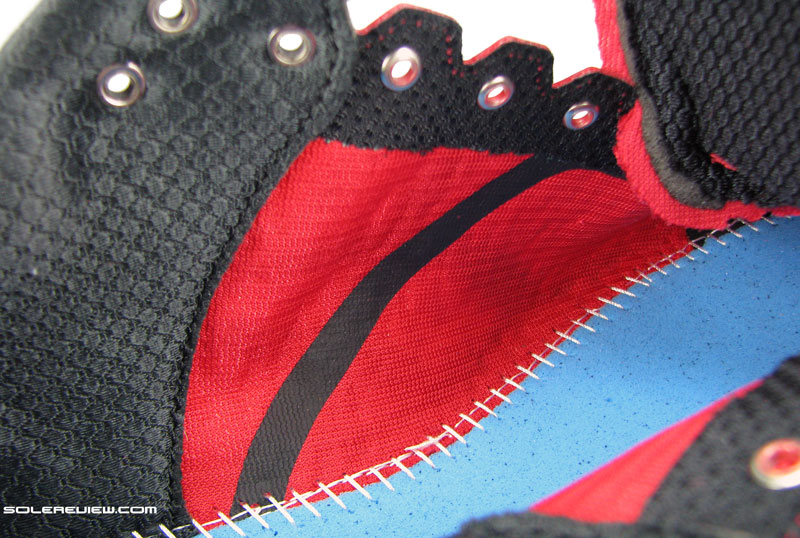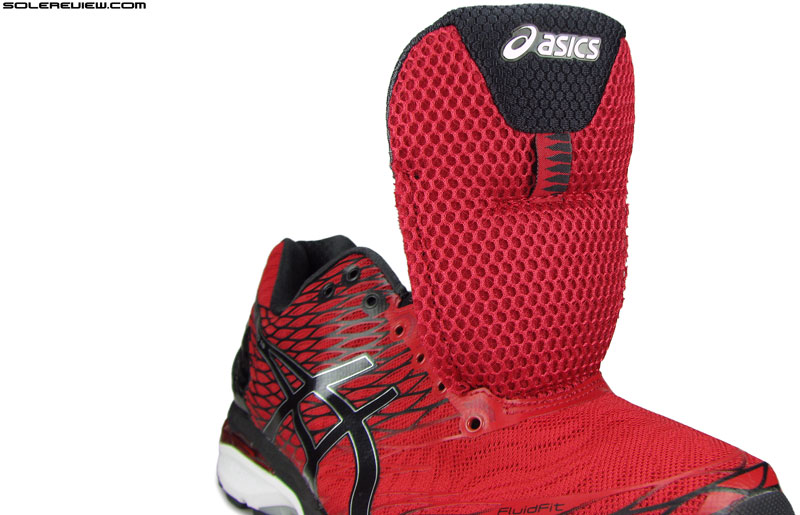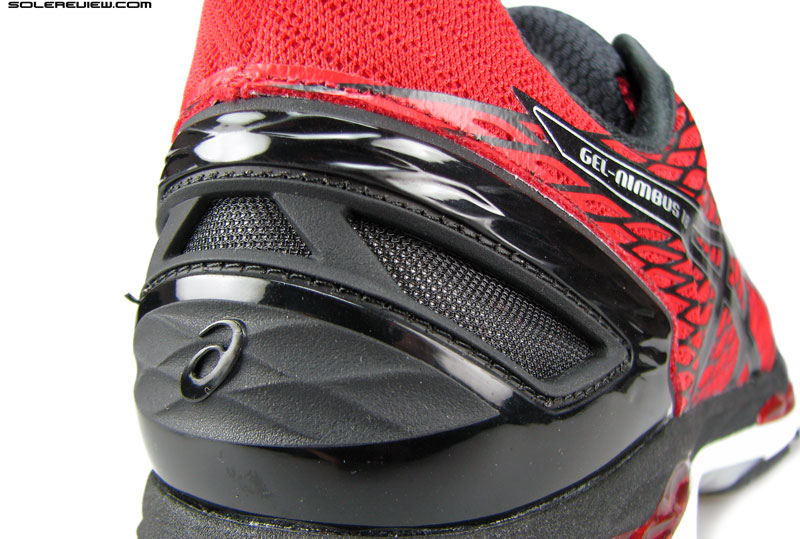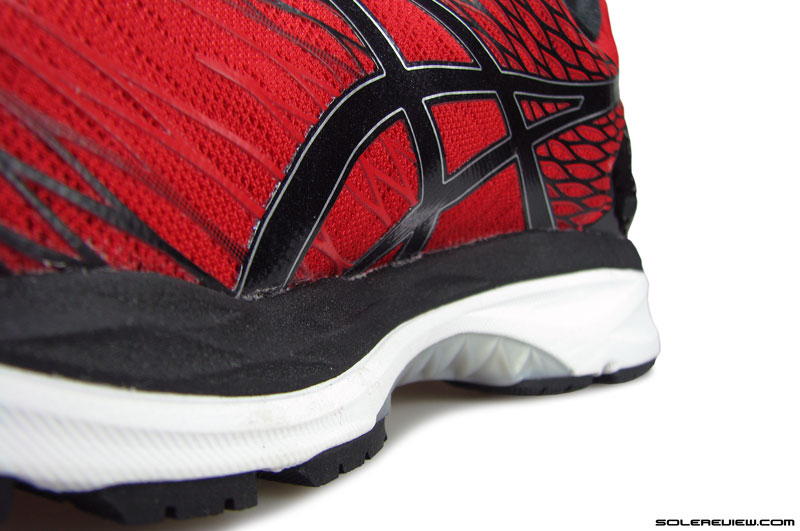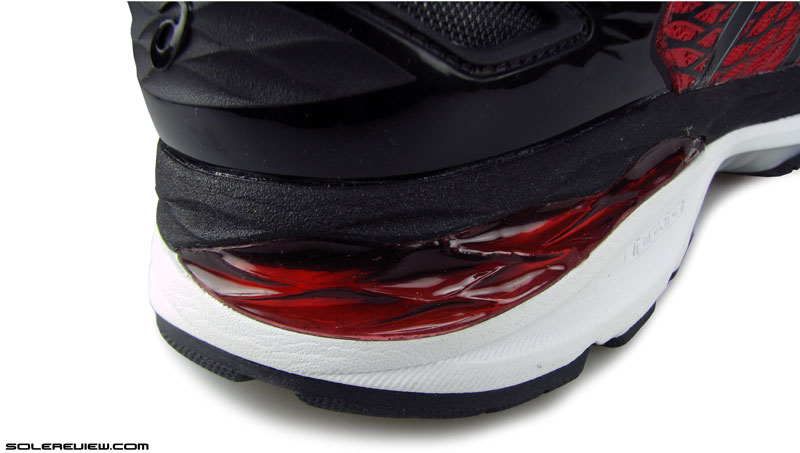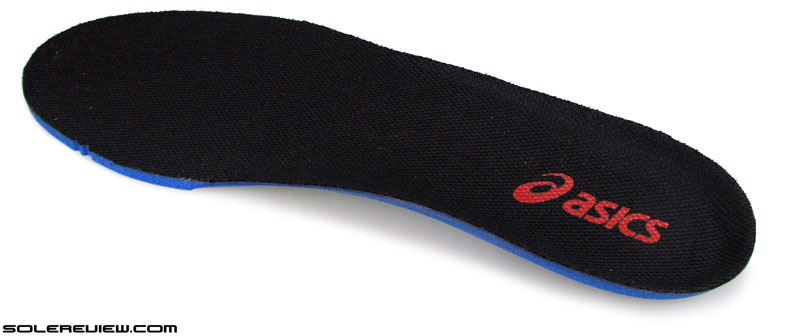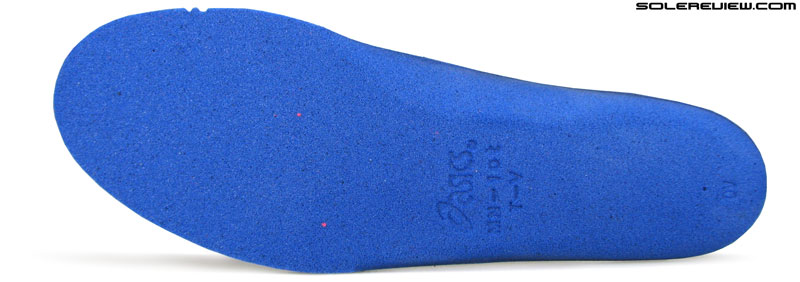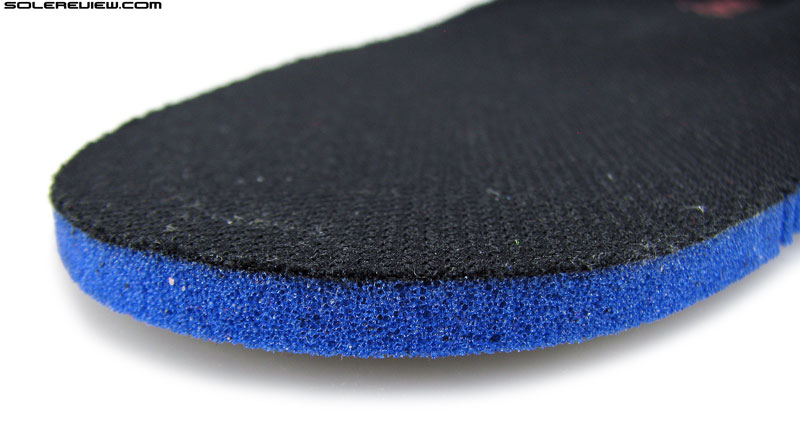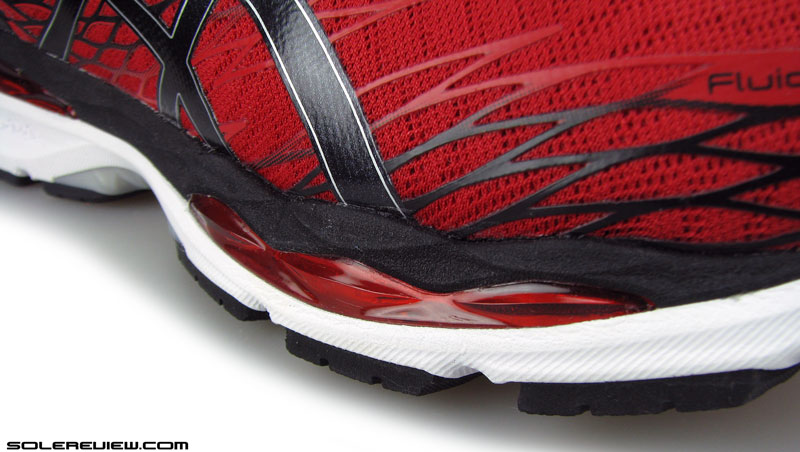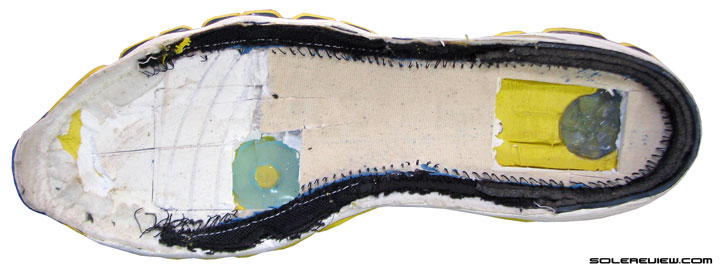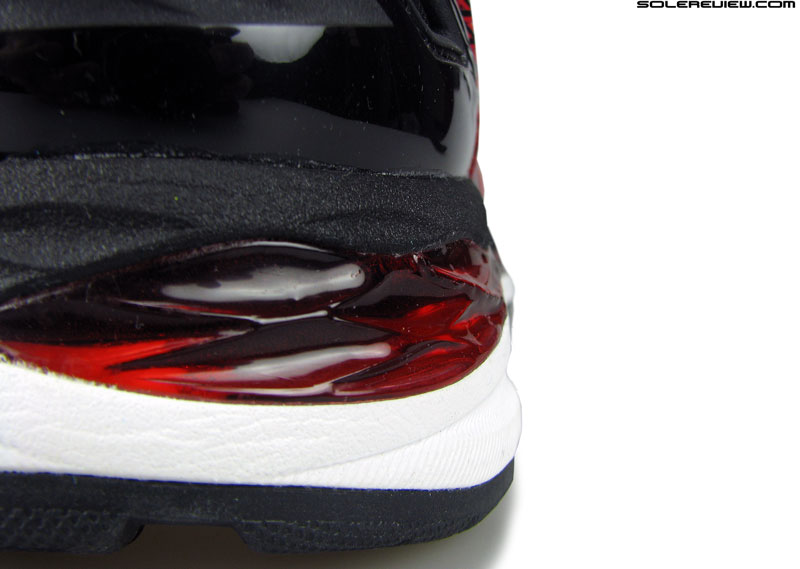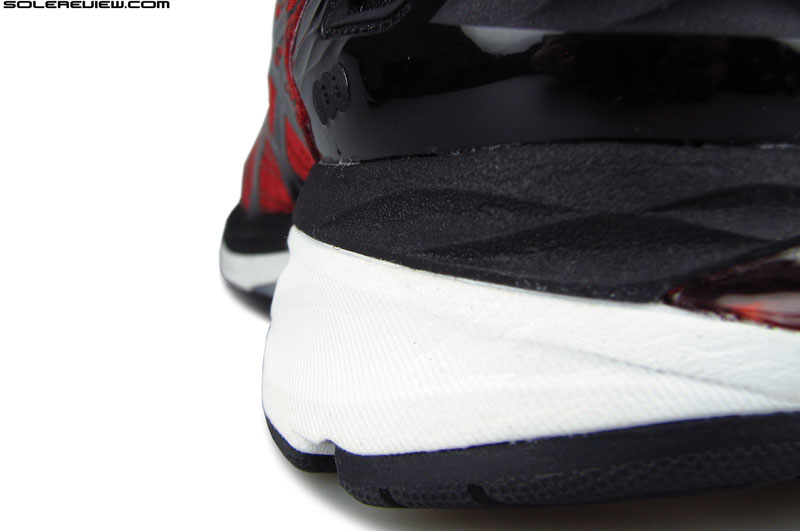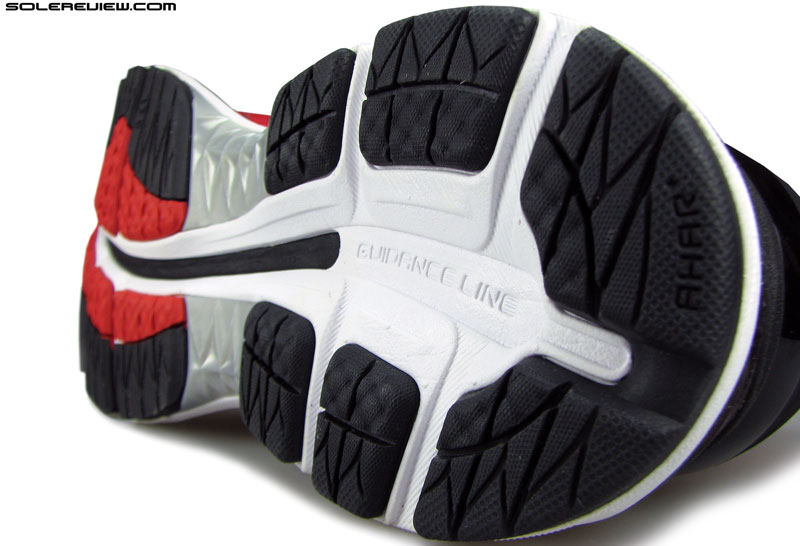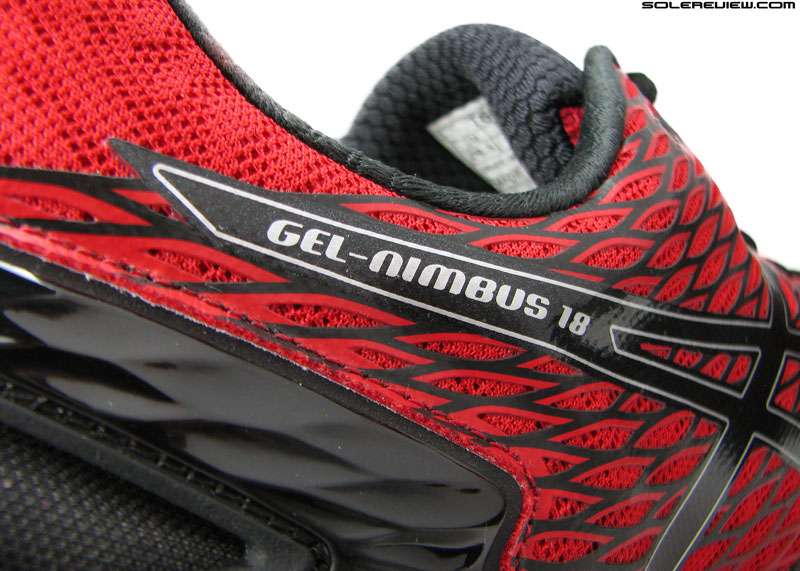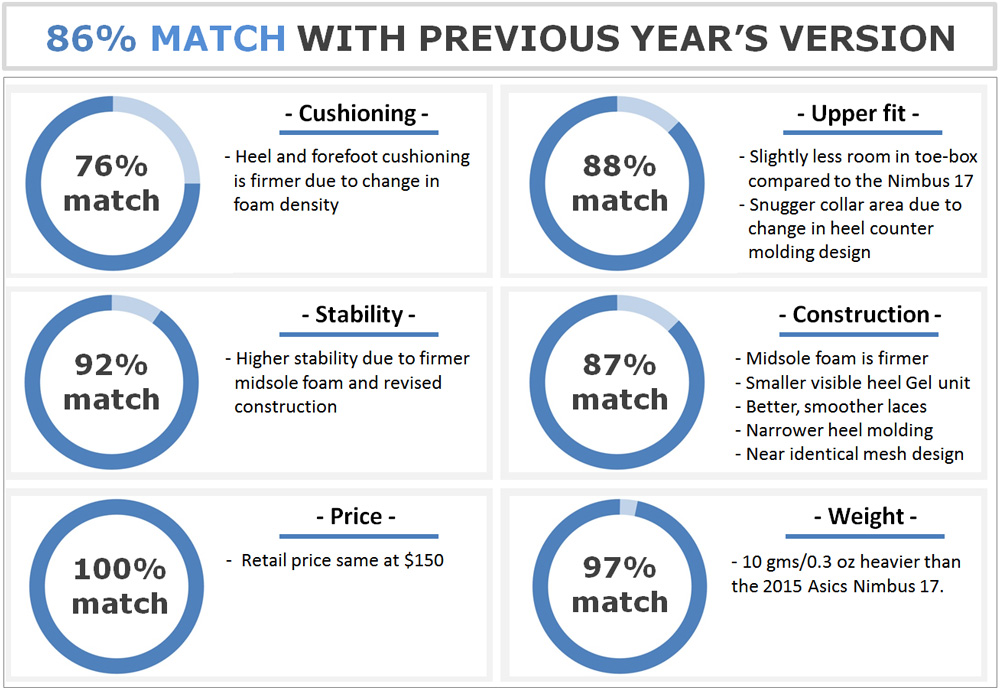After four long years of reviewing the Nimbus series, we’re beginning to get the hang of it. The hang of what exactly? Well, we’re talking about Asics’s Nimbus strategy. Without fail, the Nimbus has followed the soft-firm-soft-firm pattern since 2012. Need proof? The Asics Nimbus 14 was firm, followed by the soft Nimbus 15.
Then arrived the firm Nimbus 16, which was then succeeded by the ultra-soft Nimbus 17. And this year you have the Nimbus 18, which by now you would have guessed correctly to be firm. So maybe this yo-yo design approach with regards to the Nimbus isn’t a coincidence at all.
And why does Asics even do such a thing? That, my friend, is a question to be answered by the our friends living in Kobe, Japan. (Asics’s HQ) At this very moment, it is very likely that a group of silver haired Asics executives with a taciturn demeanor is deciding the future firm-or-soft fate of the 2018 Nimbus 20.
The Nimbus 17 was also a turning point of sorts for the long continuing model. On the stability/motion control side of things, the Kayano underwent a drastic transformation with the 22 in 2015.
These two models shed the layered upper design which followed the tradition of stitching synthetic leather panels over a fulsome spacer mesh. The new Nimbus (and Kayano) aligned themselves with the general industry direction, resorting to the use of engineered mesh uppers and the like. For no good reason, Asics tinkered with the fit too – making both of their franchise models fit narrow, shallow, and pointy in the front.
Except for the firm ride, the Asics Nimbus 18 is very similar to the 17 in overall look, feel, and fit. There are a couple of changes in the upper fit, but other than that, the new Nimbus has a familiar interior environment.
Although the matter of whether or not you took to the 17’s updated fit is for you to decide. We’re just the messenger here, telling you like it is.
Some shoes have clear-cut areas of good or bad, while a lot of attributes require a personal interpretation. For example, areas such as the brand new Nimbus 18’s firmer ride quality and the slightly shorter sizing.
And did we say shorter sizing? How did that happen, if the Nimbus 18 sticks to an upper design lifted straight from the 17?
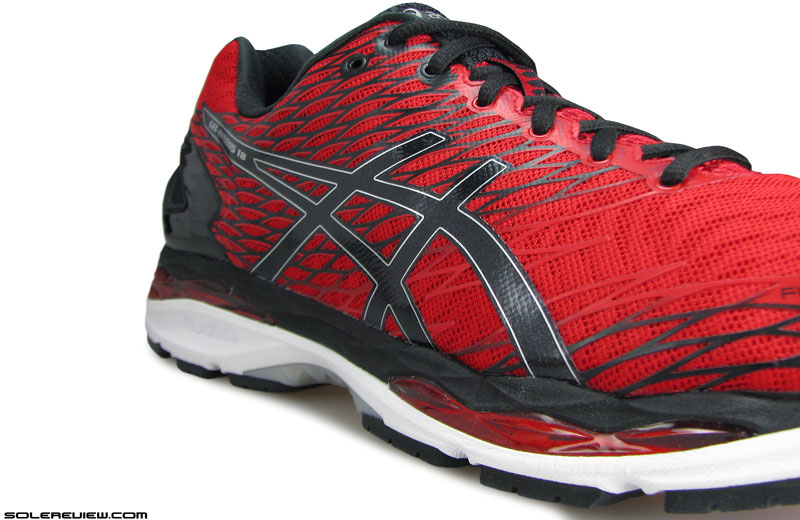
Very similar to the Nimbus 17. The new model has a single piece outer mesh panel with thin layers laminated over it.
The new upper aesthetic bears close resemblance to the Nimbus 17. The Nimbus 18 is made of a one-piece mesh component which is only joined by a single seam at the back. Thin, urethane layers over the mesh add support, and there are a couple of fused tapes inside to keep things in shoe-shape.
Asics’s aversion to any kind of sleeved design is evident on the Nimbus 18, and true to tradition the tongue is attached only to the forefoot. As expected, a small amount of sideways slide happens during runs.
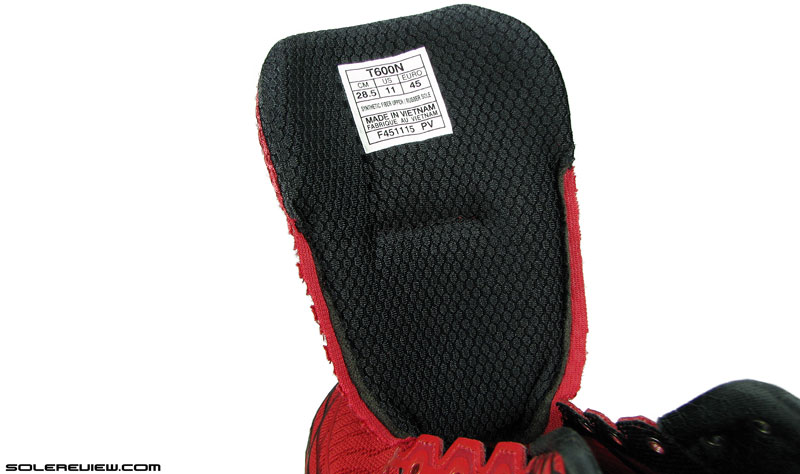
Tongue lining is the same as the type used on the Nimbus 17. Which is great – because the fabric is soft to the touch and its quilted innards provides sufficient padding over the foot.
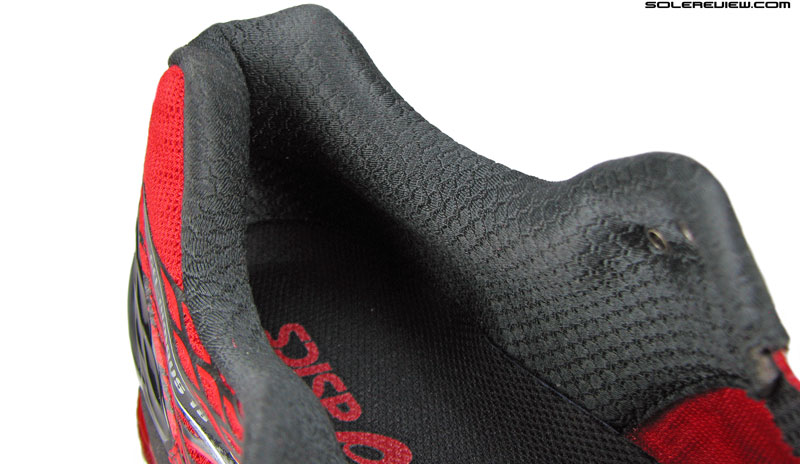
Same heel lining and foam padding combination from the 17. There’s a change in the fit due to the counter molding, however.
Tongue and collar lining materials and foam quilting is identical to the Nimbus 17. Most brands have their favorite choice of lining, and it does no harm to stick to a material which works well. And it does so in Nimbus’s case, feeling soft to the touch under the tongue and around the ankles.
There are a couple of tweaks around the lacing area. Last year’s Nimbus had these terrible laces which felt rough and twisty, a result of a poor two-tone color execution gone awry. Fortunately, Asics swaps those laces for a single color type which has a softer hand-feel and better lacing behavior.
All the eyelet holes on the Nimbus 18 have been reinforced with a switch to a round, metallic variety. This is a slight twist on the Nimbus 17’s design, which had the first and the last two eyelets as ‘invisible’ ones without the backing of a metallic base.
Not that the Nimbus 17’s metal bereft eyelets were prone to getting ripped out, but a little extra durability never hurt anyone.
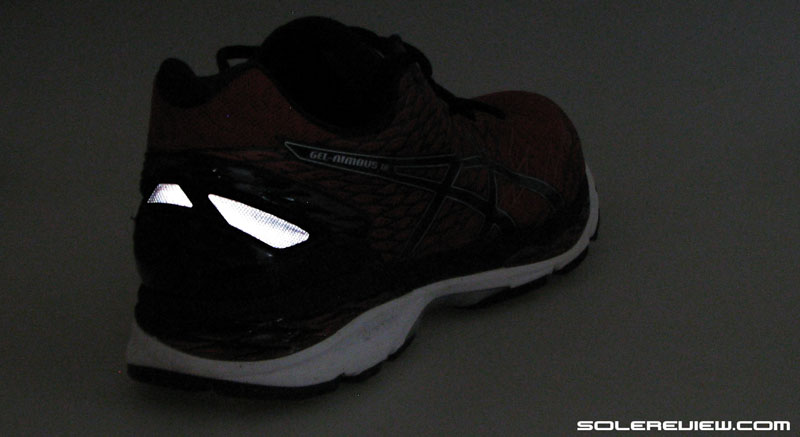
The heel gets luminous at night when called upon, but is dim when compared to the larger heel windows of the outgoing N-17.
The heel section is where the relatively significant changes happen. The plastic counter wrapping the heel is larger and higher than the Nimbus 17’s. So it’s somewhat counter-intuitive that the reflective windows have been sized down. Though low light visibility is adequately present, it is half the size of what the Nimbus 17 had.
The medial (inner) sides of the Nimbus 18’s heel upper are marginally higher than the 17’s wall. But it doesn’t seem to add up with the substantial increase in the plastic counter’s height, so where is the extra bulk coming from?
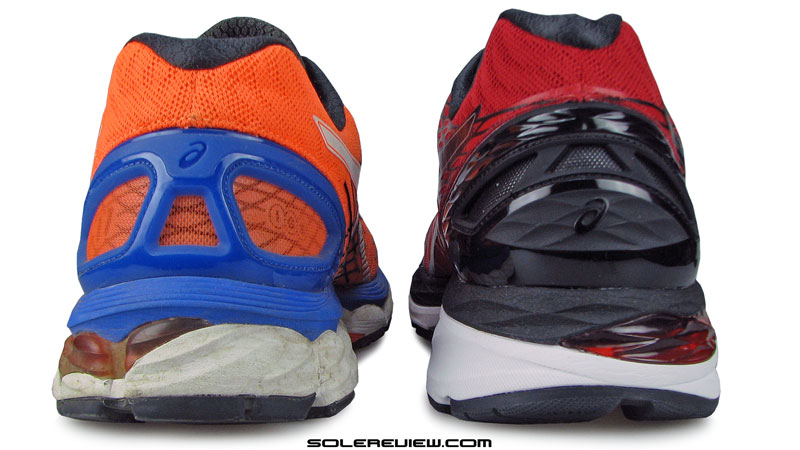
There are quite a few changes in the way the midsole heel center is put together. For example, the foams are stacked diagonally on the Nimbus 18 (right), and the entire stack is lower too. That allows the plastic heel counter to be higher.
If you compare the thickness of the heel midsole, you’ll realize that the Nimbus 18 has a lower stack thickness right down the heel center. There’s less of the midsole foam+Gel material between the edge of the plastic counter and the outsole layer versus the Nimbus 17. That margin gets adjusted in the higher heel counter.
Regardless of the difference in thickness down the heel center edge, we doubt if overall stack heights have changed. When viewed from the side, both versions appear equal in midsole thickness. The specs on Asics’s website confirms this; both the Nimbus 17 and 18 are listed to have stack heights of 23 mm (rear) and 13 mm. (front)
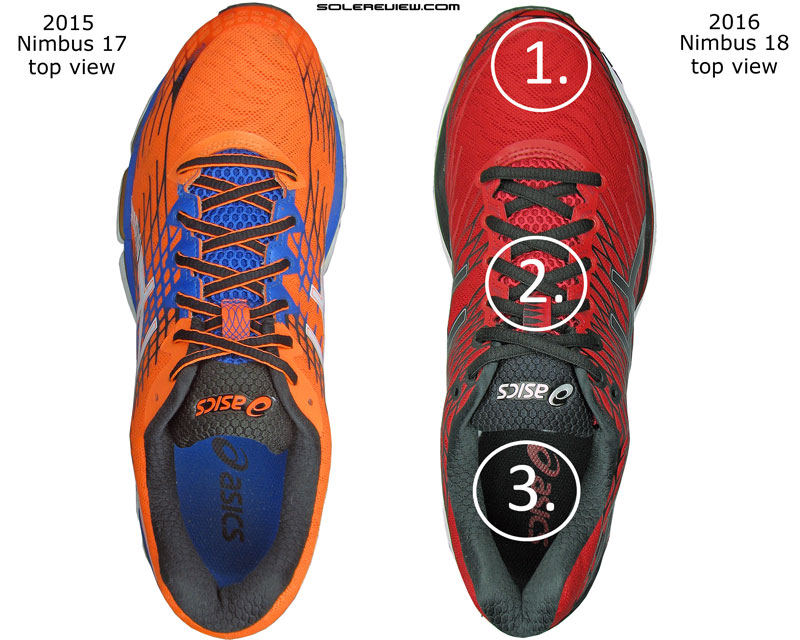
1) Less space in front of the toes due to #3. 2) Better, softer laces 3) The heel is molded narrower, leading to the events described in #1.
Yet what really makes a difference is the manner in which the heel counter is molded. When viewed from the top, the Nimbus 18’s counter is molded narrower than the wider, splayed design of the 17. This affects the upper fit of the 18, as the foot sits slightly forward on the shoe.
This comes at the expense of space ahead of the toes, right at the tip of the Nimbus 18. We’ve seen this change play out in other brands too, where the heel counter design has a corresponding effect on sizing.
On our particular pair, we had a problem of a different kind.
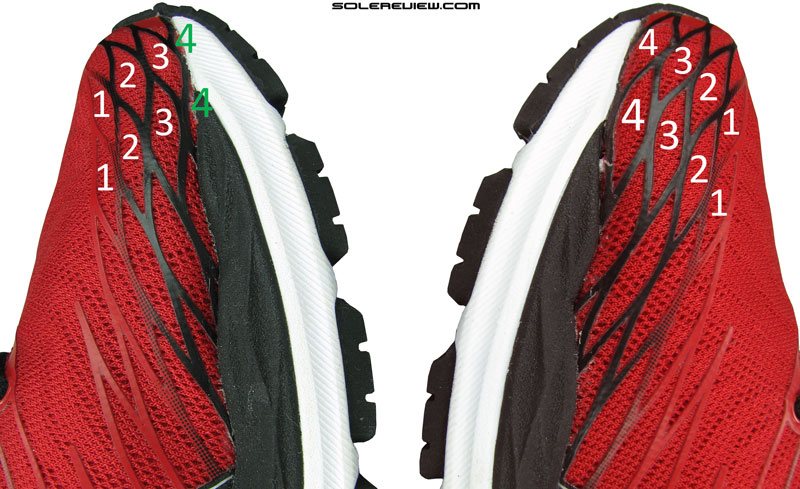
The Nimbus 18’s toe-box was incorrectly assembled, making the left shoe feel tighter on the medial side. Follow the numbers; observe how #4 disappears into the midsole on the left shoe.
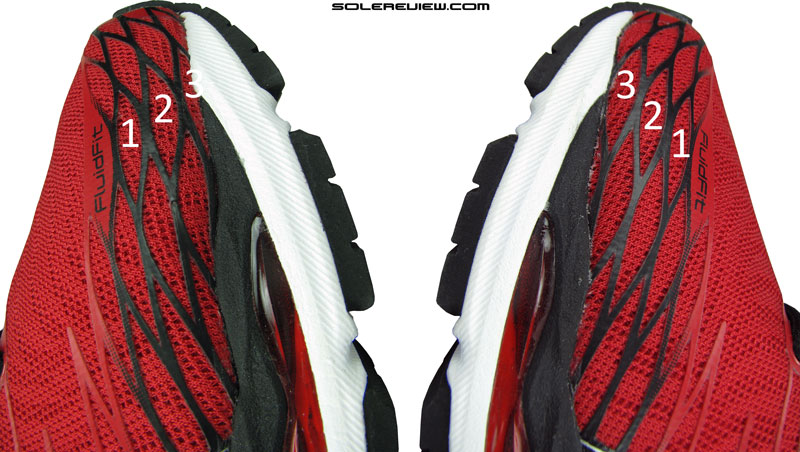
While the lateral (outer) side isn’t as bad as the medial side, there are discrepancies nonetheless.
By default, the upper construction makes the medial toe-box shallow. That’s where the big toe happens to be. On our pair, the left and right shoe wasn’t symmetrical in assembly.
The left midsole eats up more of the upper when compared to the right, making the left toe-box fit tighter than the right. We’ve seen this in Brooks and adidas, but first time on a Nimbus. Slipping quality standards of late?
Something happened to the Nimbus’s fit after the 16th model. The 17 arrived with a brand new design and a change in upper fit. The toe-box was shallow and relatively pointy, and even the forefoot lost some of its previously available width.
This was in stark contrast to how the earlier Nimbus models such as the V15 and 16 fit, where there was ample room above and around the toes. A close parallel we can think of is the Nike Pegasus, where the shoe went from a spacious toe-box on the Pegasus 30 to a shallow and point front-end on the 31.
Nimbus loyalists who have skipped the 16 and 17 and directly moving up from the Nimbus 15 to the 18 will have a hard time wrapping their heads around the lack of toe-box space.
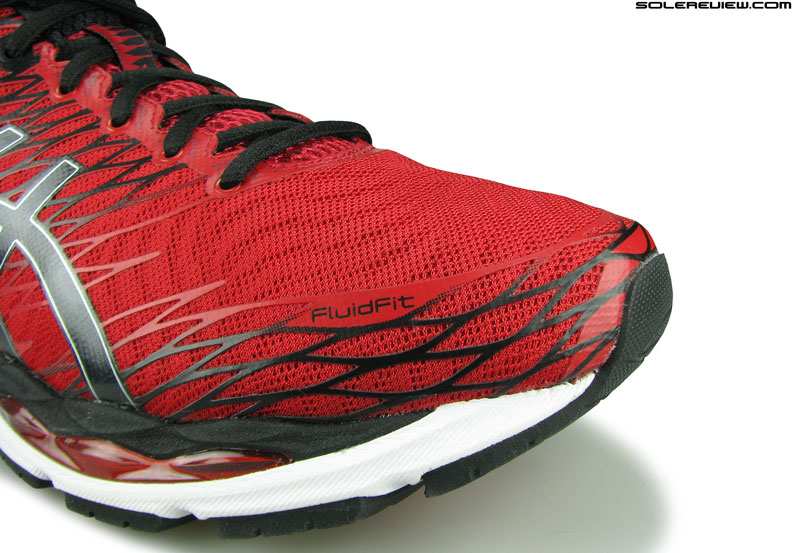
The toe-box is shallow and pointy like the Nimbus 17. That aspect is accentuated due to the narrow heel molding this year.
Toe-box space is at a premium on the Nimbus 18, more so than the 17’s existing space compromised toe-box. You might need to buy a half-size larger than the 17, but make the final decision only after you’ve had the chance to try the 18 on.
The interiors of the Nimbus 18 feel plush and smooth. There are barely any seams inside, an advantage typical of single piece mesh construction. The tongue padding feels soft over the foot, and insulates lacing pressure well.
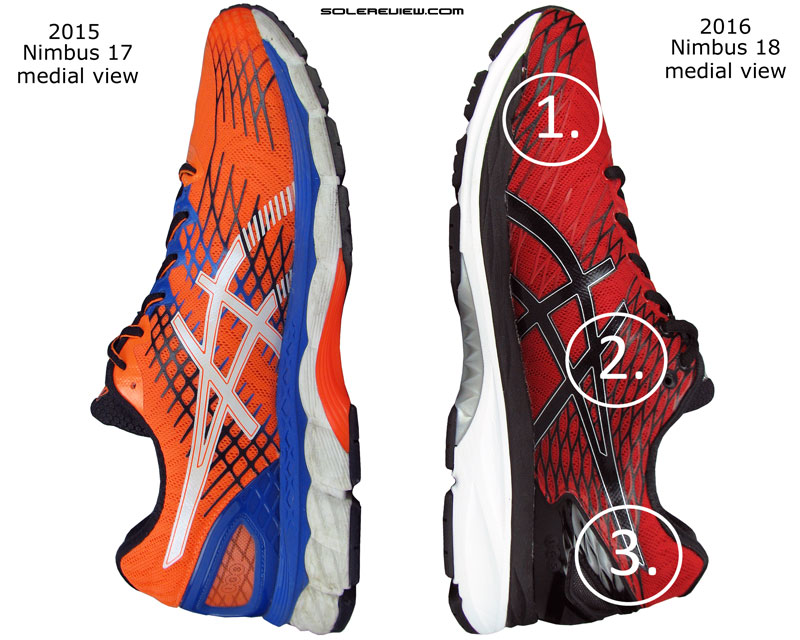
1) Paucity of medial toe-box space 2) Interiors feel smooth due to the one piece design 3) Medial heel collar is higher than the Nimbus 17’s.
We said something about the collar walls being higher, and that is a part which we found distracting. This is noticeable more on the medial (inner heel) side than lateral, and the soft walls of the 17 is replaced by what feels like a firmer material.
The materials aren’t firmer, of course, because they are exact carry-overs from the 17. The collar walls feel firmer simply because they rise higher than the ones wrapping the Nimbus 17’s heel.
Wonder if the updated heel counter is the reason behind the 18’s weight increase. A mere 10 grams or 0.3 oz increase might not seem a lot without context, but one has to to keep in mind that the Nimbus 18 is 363 gms/ 12.8 oz.
This makes the Nimbus the heaviest shoe in its class; even the polyurethane (heavier than EVA foam) equipped Ultra Boost is lighter.
So while the Nimbus 18 might look lightweight due to its webbed upper, the traditional midsole design is a drag on the shoe’s weight. There are updates applied to the midsole and outsole construct, but the fundamentals stay the same.
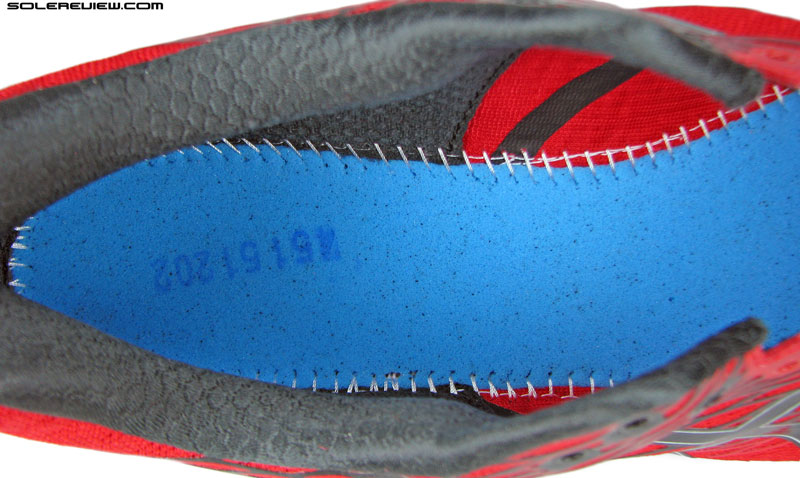
The soft, blown foam lasting made its appearance on the Nimbus 17, and carries over to the Nimbus 18 too.
The midsole has a dual-stack of EVA foam. There’s a firmer layer (black) over the softer white EVA foam, and there’s a section of visible Gel pad under the lateral heel and forefoot. On top of that is a very soft, blown foam lasting and a cushy insole to match.
As far as the Gel cushioning is concerned, it is pretty much a marketing scam. A snake-oil equivalent of running shoe tech, if you will. So it isn’t of any consequence that the Nimbus 18 gets a smaller serving of visible Gel sandwiched between its rear midsole layers.
We wrote about the Gel pads at length in our Nimbus 17 review, as well as in our Quantum 360 discussion. The Gel pads are located only on the outer fringes of the midsoles, and most of the cushioning is delivered by the foam layers.
Cushioning from the large Gel units if any, is limited only to the lateral heel area. There are Gel pads under your foot, but they are too small to be of any significance.
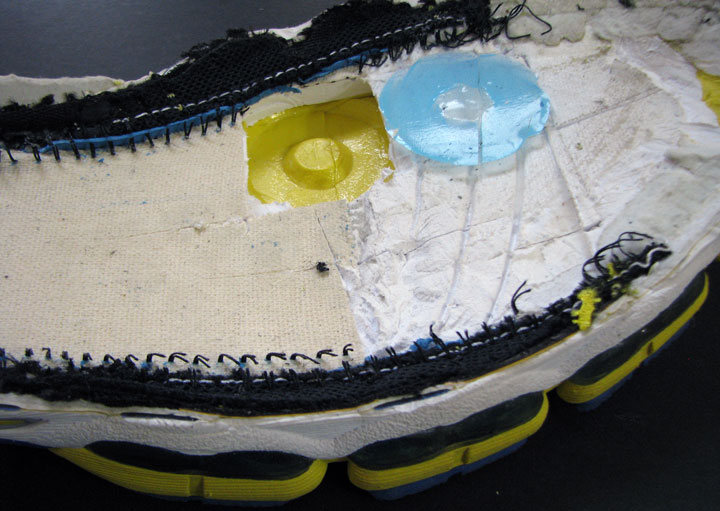
The forefoot side windows are all show and no go. Most of the cushioning sensation comes from the foam. (Nimbus 15 picture)
Here you go – a couple of pictures from our Nimbus 15 dissection just to show you how useless Asics Gel is. Mostly.
And what makes the Nimbus 18 ride much firmer than the 17? That’s easy to explain. The EVA foam density has increased throughout, making both the upper and lower midsole much firmer than before.
The black foam on top is not just a rim as it runs under the heel, and works as a padding layer. This black foam is now much firmer than its equivalent (blue foam) on the Nimbus 17.
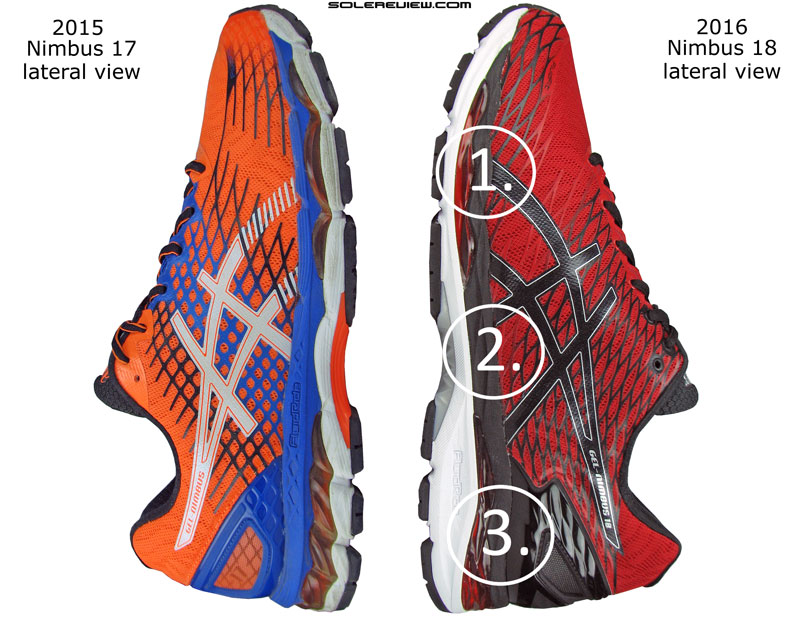
1) Firmer forefoot 2) Better midfoot transitions 3) Firmer and supportive heel cushioning vs. the N-17.
The lower white foam is also much firmer too, which combines with the harder upper midsole to result in the updated ride quality. While the Nimbus 17 was all about pillowy softness, the 18 delivers a cushioned ride but with a distinctly firm feel.
If you haven’t run in the Nimbus 17, then it is likely you won’t find anything amiss. The Nimbus 18 has a cushioned ride, only relatively much less so than the 17.
There are couple of bright spots with respect to the Nimbus 18’s firm ride aspect. At times, the Nimbus 17’s super soft midsole felt like it was bottoming out on impact, making the shoe feel very slow and mushy.
Frankly, we think that the Nimbus 17 overdid the soft aspect of the ride. If there was a good example of a super soft ride, it would be the Nimbus 15 or the earlier versions of the Nike Vomero (V 3-5). Even the adidas Boost ST does it well.
The added firmness lends the Nimbus 18 a supportive ride quality. The midsole keeps the foot centered, and the shoe feels faster than the 17. The second silver lining is the Nimbus 18’s transition manners.
The N-17’s ultra soft foam made sure that you felt the outsole lugs beneath as you labored through the gait cycle. In contrast, the firm layer of the Nimbus 18 (especially the upper black foam) offers better protection from the imperfections below.
Nimbus 17’s softness rendered the ‘guidance line’ ineffective, something which we pointed out last year. The firmer Nimbus 18 makes the transition groove more effective, similar to how it performed on the Nimbus 14 and 16.
You feel none of the lumps and bumps from down below, as was the case with the Nimbus 17. The fleeting thought of comparing the 18 and 16 might cross your mind, but calling the 18 similar to the 16 is a bit of a stretch. The 16 was a very different Nimbus, a shoe from another time and place.
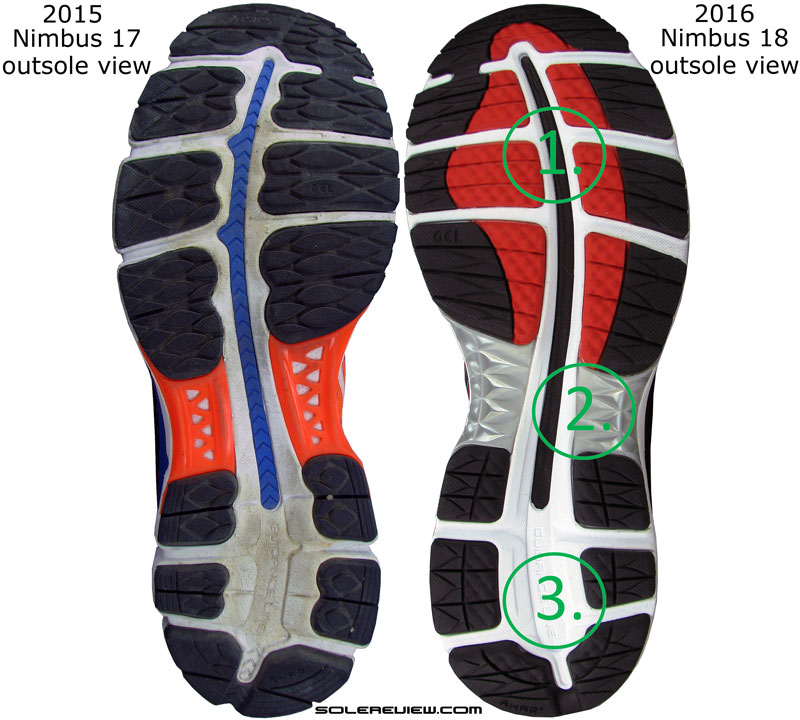
1) The gap between the outsole lugs and the transition groove has narrowed 2) Filled out midfoot shank/bridge 3) Firmer outsole, rounded outsole rubber slabs throughout.
The better transition quality might also have something to do with the updated outsole design. The groove which runs through the outsole center is deeper than that on the Nimbus 17, and the gap between the forefoot lugs has narrowed. The plastic midfoot shank now comes with a filled-out design; not that it makes any difference though.
The outsole rubber lugs have a rounded profile, which is a change from the squarish blocks seen on the Nimbus 17. That also could be a reason for the Nimbus 18 to hold its line better, as the corners blend better with the midsole foam base they come mounted on.
There has never been a reason to complain about the Nimbus’s outsole grip and durability, and the combination of thick rubber and its liberal usage makes good on that precedent.
What the Nimbus 18 lacks however, is character. That is a strange thing to say in a shoe review, but take a moment to think about it. The Nimbus 15 was superbly soft and spacious, and the firmer Nimbus 16 had a premium upper execution.
The Nimbus 17, flawed though it may have been, left an impression of an ultra-soft ride which few others could match.
Competence and character are two different things. In our opinion, the Nimbus 18 is free of the shortcomings which was part of Nimbus 17’s baggage. You know, the part about the lumpy and mushy ride.
Shoe vs. shoe, the N-18 rides better than the 17, and hence more competent. But then, you wonder: how much value does the Nimbus 18 pack over the cheaper Cumulus 17, which gets the same job done for much less? The Nimbus 18 feels just like any well-padded shoe.
At $150, you need a running shoe to have both competence and character. The Nimbus 18 sadly, is endowed with only one of the two.
(Disclaimer: For this review, Solereview bought the shoe at full US retail price.)
Looking to upgrade your Gel Nimbus 17 to the latest version, but not sure how the latest 2016 model compares? We can help here. The following info-graphic is a ready-reckoner for what changes you might expect in the new model vs. old. To make this more fun, we’ve put in a system of percentage match, which calculates a weighted average for a set of attributes.
A higher or lower match percentage is neither good or bad. The % number just tells you how similar or distanced the new shoe is from the previous version. Total match % is a result of weighted averages.

